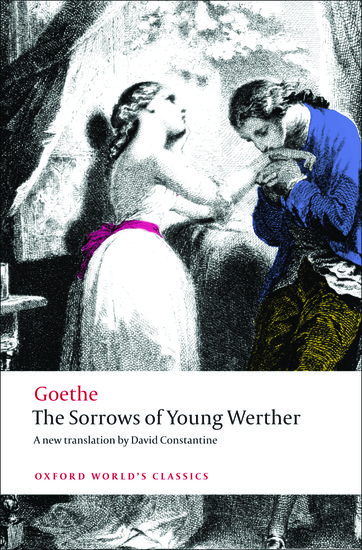Goethe was born almost dead on 28 August 1749. He opened his eyes, he lived, only when the midwife rubbed his heart with wine. Perhaps that uncertain start awoke a determination in him to stay alive as long as possible. There’s a wry saying in German: Alle Menschen müssen sterben — ich auch, vielleicht (All men must die — me too, perhaps). And that’s how Goethe lived, cannily keeping out of the way of death, cramming as much life as he could into the time allowed.
Goethe was seriously ill several times in his life and was besides disposed to depression and hypochondria. In self-defence against too many demands from too many people, he fled or withdrew. He ran from love-affairs that he felt might overwhelm him. He had a sure sense of what he must do to survive — and to survive as poet, for in following that vocation he was most himself. He had a superstitious horror of anything that touched on sickness and death — avoided funerals, even his wife’s; disliked churchyards; abhorred crucifixes; and indeed, being known among his contemporaries as “the old heathen,” he detested all the morbid and otherworldly tendencies in Christianity. He was what the Germans call diesseitig (on this side, in the here and now), not jenseitig (not over there, in the beyond). He was hard on weakness, chaos, self-destructiveness in other people. He came through his own Sturm und Drang (Storm and Stress), and had no sympathy for those who didn’t come through or never grew out of theirs. In his eightieth year, hearing of the death in Rome of his hapless son August, the only one of his five children to survive much beyond birth, he said: “Over the graves then, onwards!”
Ruthlessly in favour of life, Goethe was the creator, in Werther, of the very type of person who is drawn towards and finally into death. He wrote the novel fast, in four weeks, to be rid of that dangerous possibility or temptation in himself — to be free, as he said, for the further enjoyment of life. Many of his readers didn’t feel so released; in some it fatally encouraged their own inclination to let go. And of course, there was no finality in Goethe’s remedy even for himself. Poets are incapable of “closure”; they hate the very idea of it. Again and again he found himself back in Werther’s predicament, most scandalously in 1821, in love with a seventeen-year-old. In 1824 a fiftieth-anniversary edition of Werther was published, for which Goethe, then seventy-five, supplied a poem addressing the ‘much lamented shade’ in whom he still knew himself. Goethe never did get rid of Werther. Wherever he went, throughout his life, that suicidal character shadowed him.

Like many poets — Yeats, Graves, Apollinaire come to mind — Goethe opposed death mainly by love. It is an old — the old — combat: Eros versus Thanatos, Love versus Death. Goethe was almost always in love. His rebirths, his extraordinary shifts into new poetry, all have a new love at their heart: the Sturm und Drang lyrics, the Roman Elegies, the West-Eastern Divan, the “Trilogy of Passion” — all very different, all written by the same poet, in new circumstances, in a new mode, in love again. Faust, the play he worked at, on and off, for sixty years, the very concept of it shifting as he grew, became, in Part II, a glorious celebration of Eros, the life-giver. Faust is saved, not for any good in him (he is perhaps the least likeable ‘hero’ in world literature), but through the redemptive love of Gretchen, whom he seduced and abandoned.
In Werther Goethe was more consequentially tragic than he ever would be again. A chief component of our sense of tragedy is waste. Werther’s death is a terrible waste. Such a talented young man, so in love with life, so finely alive to the beauty and changing character of the natural world, so able in his letters to bring home that beauty to others. But in circumstances that thwart and oppress him, in an increasingly partial view of his situation, he converts the chief good in him, his passion, his capacity for love, into its deadly opposite. He sides with death against himself. There is enough against him and his beloved Lotte anyway. In that society the likely fate of any man or woman of sensibility is what Elizabeth Bowen calls “the death of the heart.” Werther kills himself. And, as the narrator says, “they feared for Lotte’s life.”
Werther requires that we answer back; that we see what is going to waste in Werther and in Lotte, and that we part company from him when he cannot any longer defend himself and goes his way into death. The injunction of the novel is Goethe’s own continual injunction to himself: resist, fight back, make a life you can call your own. Side with Eros against the many and various ways of Death!



[…] the end, says Goethe, we depend upon creatures of our own making. Ultimately, what is needed to fix a broken planet must […]
[…] after Marchant’s book was published, works were still created on the subject, including Johann Wolfgang von Goethe’s poem Der Todtentanz, Franz Liszt’s Totentanz for piano and orchestra, and, most famously, […]
[…] the end,” says Goethe, “we are creatures of our own making.” Although offered as a sign of optimism, this […]
[…] many centuries and has taken many forms, from folktales to puppet shows to plays to novels. Since Johann Wolfgang von Goethe completed Part I of his play Faust in 1808, variations on the tragedy have inspired at least a […]